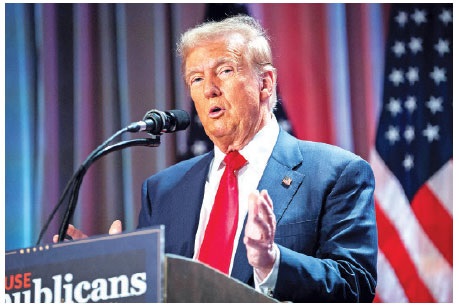Bangladesh’s Strategic Future under Trump Administration
Morshed Noman | Source : Daily Sun, 18 January 2025

Donald Trump’s inauguration as the 45th president of the United States will take place on 20 January. Trump’s presidency, marked by a transactional and pragmatic approach to foreign policy, has the potential to reshape the dynamics of bilateral ties, particularly in light of recent political developments in Bangladesh.
The political landscape in Bangladesh has been significantly altered by the formation of an interim government following the July revolution and the fall of Sheikh Hasina’s regime. These changes carry substantial implications for US-Bangladesh relations, especially given Trump’s stance on governance, democracy and political stability in foreign nations.
A key challenge in US-Bangladesh relations lies in the United States’ traditional emphasis on democratic values, human rights and free and fair elections. The Biden administration has been vocal about concerns regarding the erosion of democratic freedoms in Bangladesh, including restrictions on the press, political opposition, and judicial independence. Interim governments in Bangladesh, often formed to oversee electoral processes amidst allegations of irregularities and partisanship, would likely attract close US scrutiny.
Under a Trump administration, however, these concerns might take a different tone. Historically, Trump’s stance on democracy promotion has been more transactional and pragmatic than Biden’s. While Trump has theoretically supported democratic values, his foreign policy has often prioritised US national interests over pressuring countries about their internal governance. A Trump presidency might, therefore, place strategic stability and cooperation above demands for electoral reform or democratic transitions in Bangladesh.
While the US might voice concerns about Bangladesh’s electoral process, especially if the interim government is perceived as biased or undemocratic, the Trump administration could adopt a more pragmatic stance. The focus might shift towards sustaining Bangladesh’s role as a strategic partner in regional security and trade. This could translate to less vocal criticism of internal political issues, with the spotlight on areas like defence, counterterrorism and economic relations.
Trump’s administration might still express concerns over democratic backsliding but would likely not leverage these concerns in diplomatic engagements unless they directly impacted US strategic interests. This hands-off approach could afford the interim government greater political manoeuvrability without facing immediate repercussions from Washington, provided stability and bilateral cooperation continue. Interim governments in Bangladesh often emerge amid political unrest and allegations of vote-rigging or violence during elections. The US Department of State has consistently raised concerns about human rights violations in Bangladesh, including arbitrary arrests, extrajudicial killings and curbs on free speech.
Under the Trump administration, human rights concerns might not rank as high unless they intersect with broader US strategic goals. If the interim government ensures stability and facilitates elections without significant unrest, Trump might view it as a stabilising force, downplaying human rights concerns in favour of economic and security collaboration.
For example, during Trump’s first term, his administration expressed concerns about human rights in countries like Saudi Arabia but was willing to overlook them for the sake of strategic partnerships. A similar approach might apply to Bangladesh, provided that the interim government maintains order and remains a reliable partner in counterterrorism and regional stability efforts.
A cornerstone of US-Bangladesh relations is the shared interest in regional stability, especially given Bangladesh’s strategic position in South Asia. The Trump administration’s focus on countering China’s influence in the region would likely lead to prioritising stability in Bangladesh over democratic ideals. Bangladesh has been an essential partner in the global fight against terrorism. The Trump administration, which emphasised strengthening security partnerships in South Asia, would likely view the interim government as an ally. Increased military cooperation, including support for training and resources to combat extremism, might follow, even if the interim government’s legitimacy is questioned.
Bangladesh’s location in the Bay of Bengal, a vital waterway in the Indo-Pacific, makes it a significant player in regional security. The US might enhance defence cooperation with Bangladesh to counter China’s Belt and Road Initiative and maritime influence. This cooperation could include providing assistance to secure the Bay of Bengal, ensuring that regional security concerns outweigh domestic political issues in Dhaka.
The US has historically used economic and diplomatic leverage to influence Bangladesh’s political trajectory. However, under Trump, this leverage would likely shift toward strategic alliances rather than ideological concerns. Interim government in Bangladesh might negotiate economic aid and investment from the US by aligning with American strategic interests in the Indo-Pacific region. Trump’s foreign policy often favoured bilateral relationships over ideological alignment, allowing Bangladesh to secure support for economic development and defence cooperation despite democratic shortcomings.
A transitional government in Bangladesh could provide an opportunity for the US to increase its engagement and counter China’s growing influence. Trump’s administration would likely frame support for Bangladesh’s political transition as part of a broader effort to limit Chinese expansion in South Asia. Under a Trump presidency, US-Bangladesh relations are likely to emphasise pragmatic engagement centred on regional stability and security cooperation over democratic reforms. While the US might voice concerns about electoral processes and political freedoms in Bangladesh, strategic priorities such as counterterrorism, maritime security and countering China’s influence would dominate the relationship.
So, it seems that Trump’s approach is likely to grant the interim government in Bangladesh greater political flexibility, provided that it remains a stable and cooperative partner in the US’ regional interests.
The writer is a journalist and can be reached